14 sept 2015
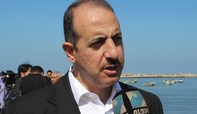
Chairman of the Hamas refugee affairs department Issam Adwan said that the information revealed by the Director of the United Nations Relief and Works Agency for Palestine Refugees (UNRWA) in Jordan David Rogers proves that the UNRWA’s crisis and its reductions are manufactured by international parties to halt its work.
In a statement on Monday, Adwan said Rogers’s statements reflect the belief among some of UNRWA’s officials that the work of UNRWA should be ended.
The Director of UNRWA in Jordan David Rogers told al-Ghad Jordanian newspaper that there have been international efforts exerted by some parties seeking to end the work of UNRWA or at least to change its identity.
“The work of UNRWA must be brought to an end”, David Rogers said.
In a statement on Monday, Adwan said Rogers’s statements reflect the belief among some of UNRWA’s officials that the work of UNRWA should be ended.
The Director of UNRWA in Jordan David Rogers told al-Ghad Jordanian newspaper that there have been international efforts exerted by some parties seeking to end the work of UNRWA or at least to change its identity.
“The work of UNRWA must be brought to an end”, David Rogers said.
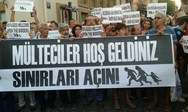
Palestinian and Syrian refugees fleeing war torn-Syria to Turkey launched a campaign to demand a safe passage to Greece on humanitarian grounds.
Hundreds of Syrian and Palestinian refugees taking shelter in the coastal city of Izmir held a mass sit-in rally as part of the “We’re just passengers” campaign launched some few days ago.
The stranded refugees called for a humanitarian corridor from Turkey to Greece so as to avoid many more deaths at sea onboard overcrowded smugglers' boats.
The “We’re just passengers” campaign called for a six-kilometer-march along the borders with Greece on Tuesday starting from the Turkish city of Edirne.
Hundreds of Palestinian refugees fleeing war-tattered Syria have been taking shelter in Turkey’s coastal city of Izmir pending a safe passage to Greece.
Hundreds of Syrian and Palestinian refugees taking shelter in the coastal city of Izmir held a mass sit-in rally as part of the “We’re just passengers” campaign launched some few days ago.
The stranded refugees called for a humanitarian corridor from Turkey to Greece so as to avoid many more deaths at sea onboard overcrowded smugglers' boats.
The “We’re just passengers” campaign called for a six-kilometer-march along the borders with Greece on Tuesday starting from the Turkish city of Edirne.
Hundreds of Palestinian refugees fleeing war-tattered Syria have been taking shelter in Turkey’s coastal city of Izmir pending a safe passage to Greece.
12 sept 2015
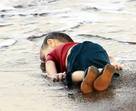
Faced with mounting criticism over their refusal to accept refugees, the Gulf monarchies have launched a campaign to combat that the claims, saying that they have donated millions and accepted vast numbers of Syrians as migrants.
Photos of 3-year-old Aylan Kurdi, the young Syrian boy who drowned while fleeing the country with his family, have sparked rage within the Arab world, mainly against the rich Gulf states. The criticism has mainly surrounded the fact that the rich Gulf states have yet to take in refugees, while much smaller and weaker Arab states like Jordan and Lebanon have taken the brunt of the crises.
On the backdrop of increasing criticism, the Gulf States have launched a massive PR campaign across a spectrum of media outlets in an attempt to quash claims of refugee denial.
Saudi journalist Tariq Alhomayed was one of the many Saudi's who took the anti-Gulf state rhetoric very personally, writing an emotional article which attempted to dispute the criticism, and even mentioned the debate within Israel surrounding the Syrian refugees: "We must be truthful and clear: its shameful that Israel has debated accepting refugees while others incite against the Gulf states, instead of confronting the merchants of the false 'opposition'."
He continued to state that, "It is shameful for the Islamic organizations, mainly the Muslim Brotherhood, and those who seek to take ownership of Arabism. It’s a shame to Iran and her proxies that Israeli is debating the option of taking refugees while Assad murders Syrians with chemical weapons, barrel bombs, and with Iranian money."
Saudi Arabia's ambassador in Italy, Dr Rayed Khalid A. Krimly, said this week that, "30 to 40 percent of all of Saudi Arabia's residents are not Saudis." Krimly continued to say that, "This figure includes a million and a half Yemenis, and more than 500,000 Syrians." According to him, since the outbreak of the Syrian and Yemeni crises, Saudi Arabia has granted the two peoples the right to receive resident status in the kingdom, forgoing the normal authorizations and conditions.
"We haven't called the migrants refugees because they have received the residency permits legally, which allows them to enjoy all the education, health, residency, and labor benefits," the Saudi ambassador said, and reiterated that his country was the largest contributor to Syria and Yemen's humanitarian aid programs.
The Gulf owned and London based Al-Hayat paper reported Thursday that, "Saudi Arabia is host to 500,000 Syrian refugees, and its schools are open to about 100,000 Syrians." According to an official in the Saudi Foreign Ministry, since the beginning of the Syrian crises, the kingdom has taken in no less than 2.5 million Syrians, insisting that they were not treated as refugees or stuffed into refugee camps, but were in fact granted freedom of movement - in order to preserve their honor.
The UAE was quick to follow the Saudi example, with a government official telling CNN in Arabic that no less than 100,000 Syrian refugees had made their way to the Emirates since 2011, where they were granted temporary residency permits. This figure would put the number of Syrians in the Gulf country at 250,000.
Similarly to the Saudis, the Emirates had pointed at large scale funding for Syrian humanitarian programs, "The United Arab Emirates has donated $530 million in aid since the beginning of the Syrian crises, and has pledged an addition $100 million," the government source said. Kuwait has also reacted to the backlash, saying the country would provide Syrians currently staying in the country with long term residency permits when their temporary status expires.
The reactions provided by the Gulf States have seemingly failed to quell the backlash from refugee organizations, and the reactions of several international followed soon after the publication of the statements. "To me, buying your way out of this is not satisfactory," Peter Sutherland, Special Representative of the UN Secretary-General for Migration and Development told a news briefing in Geneva last week. "And I say that taking refugees is separate from giving money."
An investigation conducted by Reuters revealed that none of the six Gulf Cooperation Council states - Saudi Arabia, Oman, United Arab Emirates, Kuwait, Bahrain and Qatar - has signed the U.N. convention on refugees which has governed international law on asylum since World War Two. The report continued to say that like the rest of the expatriates that form a majority in many Gulf States, Syrians have been admitted mainly as temporary guest workers, which generally means they must have jobs lined up before they arrive, or as their family dependants.
The Gulf States are mainly worried about the political, social and economic impact of an influx of refugees, especially fellow Arabs, who might settle permanently and demand broad civil rights that temporary guest workers know not to expect.
"We're talking about countries whose nationals are in the minority," said Sami al-Faraj, a Kuwaiti security adviser to the GCC. "When it comes to the issue of refugees, we have taken a stand and that is to actually help (other) nations settle refugees."
Both Qatar and the UAE currently maintain populations of which 80 percent are foreign citizens. Saudi Arabia's population includes 40 percent foreigners, while Kuwait has 50 percent. The Gulf states have mentioned that the UK in comparison has an eight percent foreigner population. "Gulf countries are scared about more traffic on the streets, longer waiting periods in free government medical facilities, additional pressure on subsidized goods, and more use of subsidized electricity and water," Ali al-Baghli, a lawyer and former Kuwaiti parliamentarian and oil minister, said in a statement to Reuters.
Another facet of the refugee crises is centered on the security issue. The London based and Qatar aligned "Al Arabi Al- Jadid" newspaper reported on this issue with the headline "The Gulf and the refugees- support but no welcoming party." The article stated that the official stance of the Gulf states on the refugee issue is centered around the security debate, including terrorist groups using the crises to funnel into Gulf under the guise of Refugees.
Photos of 3-year-old Aylan Kurdi, the young Syrian boy who drowned while fleeing the country with his family, have sparked rage within the Arab world, mainly against the rich Gulf states. The criticism has mainly surrounded the fact that the rich Gulf states have yet to take in refugees, while much smaller and weaker Arab states like Jordan and Lebanon have taken the brunt of the crises.
On the backdrop of increasing criticism, the Gulf States have launched a massive PR campaign across a spectrum of media outlets in an attempt to quash claims of refugee denial.
Saudi journalist Tariq Alhomayed was one of the many Saudi's who took the anti-Gulf state rhetoric very personally, writing an emotional article which attempted to dispute the criticism, and even mentioned the debate within Israel surrounding the Syrian refugees: "We must be truthful and clear: its shameful that Israel has debated accepting refugees while others incite against the Gulf states, instead of confronting the merchants of the false 'opposition'."
He continued to state that, "It is shameful for the Islamic organizations, mainly the Muslim Brotherhood, and those who seek to take ownership of Arabism. It’s a shame to Iran and her proxies that Israeli is debating the option of taking refugees while Assad murders Syrians with chemical weapons, barrel bombs, and with Iranian money."
Saudi Arabia's ambassador in Italy, Dr Rayed Khalid A. Krimly, said this week that, "30 to 40 percent of all of Saudi Arabia's residents are not Saudis." Krimly continued to say that, "This figure includes a million and a half Yemenis, and more than 500,000 Syrians." According to him, since the outbreak of the Syrian and Yemeni crises, Saudi Arabia has granted the two peoples the right to receive resident status in the kingdom, forgoing the normal authorizations and conditions.
"We haven't called the migrants refugees because they have received the residency permits legally, which allows them to enjoy all the education, health, residency, and labor benefits," the Saudi ambassador said, and reiterated that his country was the largest contributor to Syria and Yemen's humanitarian aid programs.
The Gulf owned and London based Al-Hayat paper reported Thursday that, "Saudi Arabia is host to 500,000 Syrian refugees, and its schools are open to about 100,000 Syrians." According to an official in the Saudi Foreign Ministry, since the beginning of the Syrian crises, the kingdom has taken in no less than 2.5 million Syrians, insisting that they were not treated as refugees or stuffed into refugee camps, but were in fact granted freedom of movement - in order to preserve their honor.
The UAE was quick to follow the Saudi example, with a government official telling CNN in Arabic that no less than 100,000 Syrian refugees had made their way to the Emirates since 2011, where they were granted temporary residency permits. This figure would put the number of Syrians in the Gulf country at 250,000.
Similarly to the Saudis, the Emirates had pointed at large scale funding for Syrian humanitarian programs, "The United Arab Emirates has donated $530 million in aid since the beginning of the Syrian crises, and has pledged an addition $100 million," the government source said. Kuwait has also reacted to the backlash, saying the country would provide Syrians currently staying in the country with long term residency permits when their temporary status expires.
The reactions provided by the Gulf States have seemingly failed to quell the backlash from refugee organizations, and the reactions of several international followed soon after the publication of the statements. "To me, buying your way out of this is not satisfactory," Peter Sutherland, Special Representative of the UN Secretary-General for Migration and Development told a news briefing in Geneva last week. "And I say that taking refugees is separate from giving money."
An investigation conducted by Reuters revealed that none of the six Gulf Cooperation Council states - Saudi Arabia, Oman, United Arab Emirates, Kuwait, Bahrain and Qatar - has signed the U.N. convention on refugees which has governed international law on asylum since World War Two. The report continued to say that like the rest of the expatriates that form a majority in many Gulf States, Syrians have been admitted mainly as temporary guest workers, which generally means they must have jobs lined up before they arrive, or as their family dependants.
The Gulf States are mainly worried about the political, social and economic impact of an influx of refugees, especially fellow Arabs, who might settle permanently and demand broad civil rights that temporary guest workers know not to expect.
"We're talking about countries whose nationals are in the minority," said Sami al-Faraj, a Kuwaiti security adviser to the GCC. "When it comes to the issue of refugees, we have taken a stand and that is to actually help (other) nations settle refugees."
Both Qatar and the UAE currently maintain populations of which 80 percent are foreign citizens. Saudi Arabia's population includes 40 percent foreigners, while Kuwait has 50 percent. The Gulf states have mentioned that the UK in comparison has an eight percent foreigner population. "Gulf countries are scared about more traffic on the streets, longer waiting periods in free government medical facilities, additional pressure on subsidized goods, and more use of subsidized electricity and water," Ali al-Baghli, a lawyer and former Kuwaiti parliamentarian and oil minister, said in a statement to Reuters.
Another facet of the refugee crises is centered on the security issue. The London based and Qatar aligned "Al Arabi Al- Jadid" newspaper reported on this issue with the headline "The Gulf and the refugees- support but no welcoming party." The article stated that the official stance of the Gulf states on the refugee issue is centered around the security debate, including terrorist groups using the crises to funnel into Gulf under the guise of Refugees.
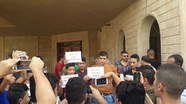
The United Nations High Commissioner for Refugees (UNHCR) closed its doors in the face of Palestinian refugees asking for revealing the fate of their relatives in the wake of the kidnapping and arrest of dozens of them in Iraq.
A large group of Palestinian refugees headed last week to the UNHCR headquarters in Baghdad calling for carrying out its responsibilities and duties towards Palestinian refugees till their return to their homeland.
The protesters said in a press release on Saturday that they were surprised that the UNHCR’s doors were closed despite not being on holiday. The UNHCR closed its doors after being informed of the protest march, the protesters said.
The protesters stood in front of the UNHCR office for three hours despite the very hot temperatures before deciding to head to the Palestinian embassy in Baghdad.
The protesters managed to meet the Palestinian ambassador Ahmed Akel and handed him a list of their demands mainly working on the release of their sons from the Iraqi detention centers and prisons and revealing the fate of Palestinian refugees who were kidnapped at the hands of armed militants.
Palestinian refugees are systematically targeted in Iraq amid total disregard of their issue.
A large group of Palestinian refugees headed last week to the UNHCR headquarters in Baghdad calling for carrying out its responsibilities and duties towards Palestinian refugees till their return to their homeland.
The protesters said in a press release on Saturday that they were surprised that the UNHCR’s doors were closed despite not being on holiday. The UNHCR closed its doors after being informed of the protest march, the protesters said.
The protesters stood in front of the UNHCR office for three hours despite the very hot temperatures before deciding to head to the Palestinian embassy in Baghdad.
The protesters managed to meet the Palestinian ambassador Ahmed Akel and handed him a list of their demands mainly working on the release of their sons from the Iraqi detention centers and prisons and revealing the fate of Palestinian refugees who were kidnapped at the hands of armed militants.
Palestinian refugees are systematically targeted in Iraq amid total disregard of their issue.
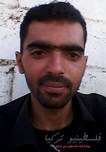
The Family of a Syrian-Palestinian refugee called Yasin Mohammad Mufleh appealed to the Turkish authorities for the release of its son who is held at a jail in Izmir city in Turkey.
The family of Yasin said he was arrested while attempting to immigrate to Greece in order to escape death in Syria.
His father told “Palestinians of Turkey” website that Yasin possesses all official documents of identity and that he has been detained for no reason. He has his university degree, UNRWA card and an ID card to verify his identity, the father added.
The head of the Turkish police station where Yasin is held revealed that he was arrested among a group of Afghani immigrants by mistake, the father disclosed.
The family asked the Palestinian Embassy in Ankara to urgently intervene for the immediate release of its detained son Yasin. It also asked for improving the living conditions of Palestinian refugees in Turkey in terms of residence permits, work opportunities, and provision of aid of all kinds.
Hundreds of Syrian-Palestinian refugees are living in Izmir city in Turkey which is considered a heading point toward Greece via the sea. Hundreds of those, including women and children, who tried to reach Greece died drowning.
The family of Yasin said he was arrested while attempting to immigrate to Greece in order to escape death in Syria.
His father told “Palestinians of Turkey” website that Yasin possesses all official documents of identity and that he has been detained for no reason. He has his university degree, UNRWA card and an ID card to verify his identity, the father added.
The head of the Turkish police station where Yasin is held revealed that he was arrested among a group of Afghani immigrants by mistake, the father disclosed.
The family asked the Palestinian Embassy in Ankara to urgently intervene for the immediate release of its detained son Yasin. It also asked for improving the living conditions of Palestinian refugees in Turkey in terms of residence permits, work opportunities, and provision of aid of all kinds.
Hundreds of Syrian-Palestinian refugees are living in Izmir city in Turkey which is considered a heading point toward Greece via the sea. Hundreds of those, including women and children, who tried to reach Greece died drowning.
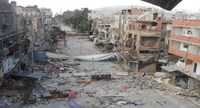
Palestinian refugees in the Yarmouk refugee camp launched a distress call for lifting the siege imposed by the Syrian regime on the camp for nearly three years, the return of normal life to the camp, and the withdrawal of all armed groups.
The Palestinian desperate cry for help came in light of the continued suffering from power outages for more than 870 days, water outages for 360 days, and the acute shortage of food and medical supplies, which claimed the lives of nearly 180 victims.
The Action Group for Palestinians in Syria (AGPS) documented the killing of 1,222 Palestinian refugees due to the almost daily shelling on Yarmouk refugee camp.
The suffering of residents has deepened after the ISIS and Nusra Front took control over the besieged camp since the beginning of April this year, giving an excuse for the Syrian regime and other groups to systematically target the camp, according to the group.
The Palestinian desperate cry for help came in light of the continued suffering from power outages for more than 870 days, water outages for 360 days, and the acute shortage of food and medical supplies, which claimed the lives of nearly 180 victims.
The Action Group for Palestinians in Syria (AGPS) documented the killing of 1,222 Palestinian refugees due to the almost daily shelling on Yarmouk refugee camp.
The suffering of residents has deepened after the ISIS and Nusra Front took control over the besieged camp since the beginning of April this year, giving an excuse for the Syrian regime and other groups to systematically target the camp, according to the group.
11 sept 2015
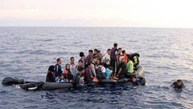
By Khalid Amayreh in Occupied Palestine
Israel is striving to reap cheap public relations from the heart-rending crisis surrounding Syrian refugees fleeing death and destruction in their country.
Israeli officials and media have been claiming that the erection by Hungary of a barbed wire fence on part of its borders to prevent refugees from entering that country is a vindication of Israel's policy of building "the separation wall" in the West Bank.
But an evil act doesn't justify the perpetration of another evil act, especially if the target of the evil acts is a totally innocent third party.
Otherwise, the genocidal crimes committed by Joseph Stalin would justify the equally genocidal crimes committed by Adolph Hitler which would in turn justify the heinous crimes carried out by Nazi-like Zionism against the Palestinian people.
Corrupt analogy
Israel, a crime against humanity by any standard of imagination, has always cited events in distant lands to justify or rationalize its own colossal crimes against the Palestinians.
Thus the indiscriminate murder of Palestinians by Israel, we are told, is necessary to prevent the recurrence of the holocaust. Similarly, we are told that Israel's Lebensraum policies (settlement expansion) are vital for the future survival of the Jewish people, as if Jews, who survived for thousands of years without a nation-state of their own, could only survive as murderers, thugs and land thieves.
In any case, any analogy or comparison between Israeli policies against the Palestinian people and the anti-refugee measures on the part of some East European governments is infinitely corrupt.
After all, Israel itself is an illegitimate state based on war, expansion, racism and ethnic cleansing. Jewish-Zionist gangs, supported by European colonialists eager to atone for centuries of anti-Semitism, invaded the peaceable Arab country of Palestine, murdered many of the native people, destroyed their homes, bulldozed their villages and fields before expelling hundreds of thousands across the borders. As such, Israel has no right to claim innocence or pretend to occupy the moral high ground. Israel will thus remain condemned for eternity no matter how many people will sing the praises of the evil entity.
Moreover, Israel didn't build the "annexation wall" in order to prevent refugees from repatriation (90% of Israel belongs to the Palestinians) but rather in order to annex (e.g. steal more land that belongs to another people.)
How can that be compared to the erection by Hungary of a barbed wire fence extending for a few kilometers?? The lie simply goes beyond the pale.
Besides, while Syrian refugees fleeing an actual holocaust by a Hitlerian regime that is effectively supported by the bulk of Western states as well as Israel, are trying to seek refuge in European countries such as Germany and Sweden, the Palestinians are actually seeking repatriation back to their own native country, not seeking immigration to a land that is not their own.
Yes, Zionist Jews do control Palestine and are keeping up this illegal occupation by brutal force. But this is very much like a gang of armed thieves taking over a land or property by force. And just as the "ownership" of the arrogated property taken over by the thieves has no legality or legitimacy, the Israeli usurpation and occupation of Palestine will remain bereft of legitimacy.
Israel is head of the snake
Many people might be prompted to think that Israel is actually innocent of the Syrian quagmire.
But this is not the case. In fact, Israel's adamant objection to the downfall of the genocidal Syrian regime is the secret behind its continued survival.
Israeli leaders reportedly have made it amply clear to the Obama administration that the survival of the Assad regime is an inviolable red line. According to a recent aljazeera documentary, the tacit alliance between Qerdaha and Tel Aviv is not new by any means. In 1967, Hafez al Assad, then Syria's defense minister, reached a secret agreement with Zionist representatives in London whereby Assad would cede the strategic Golan Heights to Israel in return for Israel (and the West) guaranteeing the continuity of the Alawite sect in power in Syria.
This should decipher and explain the enigma of Communiqué 66 which announced the downfall of the Golan Heights 48 hours before these heights were eventually seized by Israel.
Hence, Israel cannot really pretend to be innocent of the ongoing holocaust in Syria.
Syrian refugees scenario: ultimate Zionist dream
I have absolutely no doubt in my mind that Israel is hoping that the Syrian refugee tragedy would repeat itself with the Palestinians.
But this ghoulish scenario will never happen with the Palestinians, not because the Israelis are more humane than the Assad regime, but rather because the Palestinians have long taken a solemn decision: Either they live in Palestine or die in it.
Israel is striving to reap cheap public relations from the heart-rending crisis surrounding Syrian refugees fleeing death and destruction in their country.
Israeli officials and media have been claiming that the erection by Hungary of a barbed wire fence on part of its borders to prevent refugees from entering that country is a vindication of Israel's policy of building "the separation wall" in the West Bank.
But an evil act doesn't justify the perpetration of another evil act, especially if the target of the evil acts is a totally innocent third party.
Otherwise, the genocidal crimes committed by Joseph Stalin would justify the equally genocidal crimes committed by Adolph Hitler which would in turn justify the heinous crimes carried out by Nazi-like Zionism against the Palestinian people.
Corrupt analogy
Israel, a crime against humanity by any standard of imagination, has always cited events in distant lands to justify or rationalize its own colossal crimes against the Palestinians.
Thus the indiscriminate murder of Palestinians by Israel, we are told, is necessary to prevent the recurrence of the holocaust. Similarly, we are told that Israel's Lebensraum policies (settlement expansion) are vital for the future survival of the Jewish people, as if Jews, who survived for thousands of years without a nation-state of their own, could only survive as murderers, thugs and land thieves.
In any case, any analogy or comparison between Israeli policies against the Palestinian people and the anti-refugee measures on the part of some East European governments is infinitely corrupt.
After all, Israel itself is an illegitimate state based on war, expansion, racism and ethnic cleansing. Jewish-Zionist gangs, supported by European colonialists eager to atone for centuries of anti-Semitism, invaded the peaceable Arab country of Palestine, murdered many of the native people, destroyed their homes, bulldozed their villages and fields before expelling hundreds of thousands across the borders. As such, Israel has no right to claim innocence or pretend to occupy the moral high ground. Israel will thus remain condemned for eternity no matter how many people will sing the praises of the evil entity.
Moreover, Israel didn't build the "annexation wall" in order to prevent refugees from repatriation (90% of Israel belongs to the Palestinians) but rather in order to annex (e.g. steal more land that belongs to another people.)
How can that be compared to the erection by Hungary of a barbed wire fence extending for a few kilometers?? The lie simply goes beyond the pale.
Besides, while Syrian refugees fleeing an actual holocaust by a Hitlerian regime that is effectively supported by the bulk of Western states as well as Israel, are trying to seek refuge in European countries such as Germany and Sweden, the Palestinians are actually seeking repatriation back to their own native country, not seeking immigration to a land that is not their own.
Yes, Zionist Jews do control Palestine and are keeping up this illegal occupation by brutal force. But this is very much like a gang of armed thieves taking over a land or property by force. And just as the "ownership" of the arrogated property taken over by the thieves has no legality or legitimacy, the Israeli usurpation and occupation of Palestine will remain bereft of legitimacy.
Israel is head of the snake
Many people might be prompted to think that Israel is actually innocent of the Syrian quagmire.
But this is not the case. In fact, Israel's adamant objection to the downfall of the genocidal Syrian regime is the secret behind its continued survival.
Israeli leaders reportedly have made it amply clear to the Obama administration that the survival of the Assad regime is an inviolable red line. According to a recent aljazeera documentary, the tacit alliance between Qerdaha and Tel Aviv is not new by any means. In 1967, Hafez al Assad, then Syria's defense minister, reached a secret agreement with Zionist representatives in London whereby Assad would cede the strategic Golan Heights to Israel in return for Israel (and the West) guaranteeing the continuity of the Alawite sect in power in Syria.
This should decipher and explain the enigma of Communiqué 66 which announced the downfall of the Golan Heights 48 hours before these heights were eventually seized by Israel.
Hence, Israel cannot really pretend to be innocent of the ongoing holocaust in Syria.
Syrian refugees scenario: ultimate Zionist dream
I have absolutely no doubt in my mind that Israel is hoping that the Syrian refugee tragedy would repeat itself with the Palestinians.
But this ghoulish scenario will never happen with the Palestinians, not because the Israelis are more humane than the Assad regime, but rather because the Palestinians have long taken a solemn decision: Either they live in Palestine or die in it.
9 sept 2015
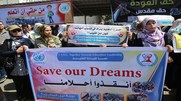
Head of Arab Staff Union at UNRWA in Gaza Suhail al-Hindi warned of the failure of the meeting scheduled to be held Wednesday afternoon between the union’s representatives and UNRWA Commissioner-General.
The meeting must be decisive, whether to have positive or negative results. However, any failure would lead to unprecedented escalation, he warned.
The meeting would deal with UNRWA’s recent decisions mainly giving school teachers compulsory leave of absence without pay for one year and increasing the number of students in classrooms, al-Hindi pointed out.
He refused to give any prediction over the meeting, saying that “everything will be clear this afternoon.”
The meeting must be decisive, whether to have positive or negative results. However, any failure would lead to unprecedented escalation, he warned.
The meeting would deal with UNRWA’s recent decisions mainly giving school teachers compulsory leave of absence without pay for one year and increasing the number of students in classrooms, al-Hindi pointed out.
He refused to give any prediction over the meeting, saying that “everything will be clear this afternoon.”
8 sept 2015
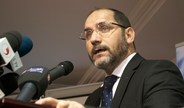
Dr. Abdul Razzaq Muqri, head of the Algerian Movement for a Society of Peace (MSP), said Monday that Israel would benefit from re-settling Palestinian and Syrian refugees in Europe.
He also held western countries responsible for the suffering of Palestinian and Syrian refugees, charging that western countries were the main reason for the instability in the region.
“Today, Europe is in dire need for immigration as new demographic studies confirm that Europe would need to bring one million new immigrants every year, a total of 47 million immigrants until 2050 in order to maintain positive growth rates.”
There is no doubt, Dr. Muqri continued, that Israel was delighted when New Zealand declared intention to receive 500,000 Syrian and Palestinian refugees. Instead of finding a solution for Israeli settlers who came to Palestine from all over the world, the land owners became asylum seekers fleeing from the oppression.
He also held western countries responsible for the suffering of Palestinian and Syrian refugees, charging that western countries were the main reason for the instability in the region.
“Today, Europe is in dire need for immigration as new demographic studies confirm that Europe would need to bring one million new immigrants every year, a total of 47 million immigrants until 2050 in order to maintain positive growth rates.”
There is no doubt, Dr. Muqri continued, that Israel was delighted when New Zealand declared intention to receive 500,000 Syrian and Palestinian refugees. Instead of finding a solution for Israeli settlers who came to Palestine from all over the world, the land owners became asylum seekers fleeing from the oppression.
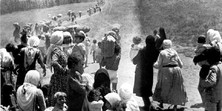
Palestinian refugees flee their homes due to the creation of Israel, 1948 Nakba (catastrophe).
In response to Israeli Prime Minister Benjamin Netanyhu’s rejection of accepting any refugees in Israel, PLO Executive Committee Member Dr. Hanan Ashrawi said:
“Israel is in the business of creating refugees and ethnic cleansing; it bears a moral responsibility for the plight of the Palestinian refugees and the grave injustices of the past."
According to the PNN, Ashrawi called on all members of the international community, in particular the United Nations, to support efforts to bring the Palestinian refugees to Palestine. “Israel should not be allowed to prevent us from welcoming the refugees to their rightful homeland,” Ashrawi added.
The executive also expressed gratitude to Germany and Austria for their selfless efforts in alleviating the humanitarian refugee crisis and providing a safe haven for the refugees from Syria. “It is our hope that other countries will follow suit in light of this devastating situation.”
These comments were made in a meeting Dr. Ashrawi had with United Nations Special Coordinator for the Middle East Peace Process Nickolay Mladenov at the PLO Headquarters. Mr. Mladenov was accompanied by Senior Political Advisor Basem Khaldi, Regional Affairs Officer Gregory Raikes, and Political Affairs Officer Kristofer Carlin.
Both parties discussed the latest political developments and the postponement of the Palestinian National Council meeting, and Dr. Ashrawi stressed the importance of national unity and elections and the need to activate and rejuvenate the PLO and all of its institutions.
She also said that “Gaza has to be dealt with in conjunction with the West Bank. They are one territorial unit.”
Dr. Ashrawi provided an assessment of the drastic conditions on the ground and said, “Israel is deliberately destroying the two-state solution. Israel must be held accountable with sanctions and punitive measures. If the international community does not undertake serious initiatives to create a new political horizon, the future for the Palestinian people will be extremely bleak and the region will be plunged into severe violence and chaos.”
The meeting also stressed continued coordination and cooperation, with enhanced consultations on issues of mutual interest.
In response to Israeli Prime Minister Benjamin Netanyhu’s rejection of accepting any refugees in Israel, PLO Executive Committee Member Dr. Hanan Ashrawi said:
“Israel is in the business of creating refugees and ethnic cleansing; it bears a moral responsibility for the plight of the Palestinian refugees and the grave injustices of the past."
According to the PNN, Ashrawi called on all members of the international community, in particular the United Nations, to support efforts to bring the Palestinian refugees to Palestine. “Israel should not be allowed to prevent us from welcoming the refugees to their rightful homeland,” Ashrawi added.
The executive also expressed gratitude to Germany and Austria for their selfless efforts in alleviating the humanitarian refugee crisis and providing a safe haven for the refugees from Syria. “It is our hope that other countries will follow suit in light of this devastating situation.”
These comments were made in a meeting Dr. Ashrawi had with United Nations Special Coordinator for the Middle East Peace Process Nickolay Mladenov at the PLO Headquarters. Mr. Mladenov was accompanied by Senior Political Advisor Basem Khaldi, Regional Affairs Officer Gregory Raikes, and Political Affairs Officer Kristofer Carlin.
Both parties discussed the latest political developments and the postponement of the Palestinian National Council meeting, and Dr. Ashrawi stressed the importance of national unity and elections and the need to activate and rejuvenate the PLO and all of its institutions.
She also said that “Gaza has to be dealt with in conjunction with the West Bank. They are one territorial unit.”
Dr. Ashrawi provided an assessment of the drastic conditions on the ground and said, “Israel is deliberately destroying the two-state solution. Israel must be held accountable with sanctions and punitive measures. If the international community does not undertake serious initiatives to create a new political horizon, the future for the Palestinian people will be extremely bleak and the region will be plunged into severe violence and chaos.”
The meeting also stressed continued coordination and cooperation, with enhanced consultations on issues of mutual interest.
6 sept 2015
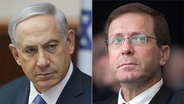
Netanyahu and Herzog
Herzog: 'Netanyahu has forgotten what it means to be a Jew;' Netanyahu: 'We must control our border against illegal migrants, terrorism.'
Israel's politicians converged in a war of words Sunday, some against and others in support of remarks by opposition leader Isaac Herzog Saturday calling for Israel to offer asylum to Syrians fleeing from a country destroyed by continued civil war.
"Israel is not indifferent to the human tragedy of the refugees from Syria and Africa," said Prime Minister Netanyahu at a weekly cabinet meeting. "But, Israel is a small country, a very small country that lacks demographic and geographic depth; therefore, we must control our borders, against both illegal migrants and terrorism.
Herzog quickly took to social media with his response, accusing that those opposed to his idea "have forgotten what it is to be a Jew, a refugee, hunted." Herzog continued, "The Prime Minister of the Jewish nation can't close his heart and the gates when people are fleeing for the lives, pursued by hunters, with babies in their hands." Netanyahu cited however, that Israel has taken multiple steps in aiding those suffering beyond its borders.
"We have already devotedly cared for approximately 1,000 wounded people from the fighting in Syria and we have helped them to rehabilitate their lives," said the prime minister. "We are speaking with African heads of state, and with the Italian Prime Minister recently and with other European leaders, about multi-lateral aid packages for the countries of origin in Africa – in agriculture, economics and security – in order to deal with the problem at its source."
In his response, Herzog made it clear he was calling for a limited number of refugees to be allowed into Israel on humanitarian grounds, but claimed that Netanyahu's policy of keeping asylum seekers out of Israel had Menachem Begin, who took in Vietnamese refugees during his time as prime minister, turning in his grave. The suggestion to accept Syrian refugees into Israel began with Yesh Atid MK Elazar Stern who publically called for similar steps as Herzog due to the current refugee crisis sweeping through Europe.
Other politicians weighed in on the feud Sunday including Intelligence and Transportation Minister Israel Katz who criticized Herzog and suggested that he volunteer to take refugees into his own home. "This is a populist suggestion," said Katz. "Israel has been on the front of humanitarian aid for years already... We need to be careful and we need to know where to draw the red line. We aren't a European country. We are too close and too involved."
Palestinian President Mahmoud Abbas made remarks similar to Herzog's Saturday, saying Israel should allow Palestinian refugees from Syria to take refuge in the West Bank - an idea that Katz and Israeli politicians also shot down. "What I said about Israel is true to the Palestinian Authority as well, said Katz."
Netanyahu: Israel Not To Be 'Submerged' by Syrian Refugees
Israeli Prime Minister Benjamin Netanyahu said, on Sunday, he would not allow Israel to be "submerged" by refugees after calls for Israel to take in those fleeing Syria's war.
Speaking at the weekly cabinet meeting, Netanyahu also announced the start of construction of a fence along Israel's border with Jordan, according to his office.
"We will not allow Israel to be submerged by a wave of illegal migrants and terrorist activists," Netanyahu said, according to AFP.
"Israel is not indifferent to the human tragedy of Syrian and African refugees... but Israel is a small country -- very small -- without demographic or geographic depth. That is why we must control our borders."
Opposition leader Isaac Herzog on Saturday said Israel should take in Syrian refugees, recalling the plight of Jews who sought refuge from past conflicts.
Palestinian President Mahmoud Abbas also called for Israel to allow Palestinians from refugee camps in Syria to travel to the occupied Palestinian territories, whose external borders have been under Israeli control since 1967.
There is already hostility in Israel toward asylum-seekers from Africa and a concerted government effort to repatriate them.
Rights groups say thousands of African asylum seekers have been coerced into "voluntary" departures.
Official figures show 45,000 illegal immigrants are in Israel, almost all from Eritrea and Sudan. Most of those not in detention live in poor areas of southern Tel Aviv, where there have been several protests against them.
'To the Golan heights'
The start of construction of the 30-kilometer (19-mile) fence announced by Netanyahu involves extension of a security barrier to part of its eastern border with Jordan.
Netanyahu said when it was approved in June that the new fence was a continuation of a 240-kilometer barrier built along the Egyptian border which "blocked the entry of illegal migrants into Israel and the various terrorist movements."
In its first stage, the new fence is being built along Israel's eastern border between Eilat and where a new airport will be built in the Timna Valley.
"We will continue the fence up to the Golan Heights," Netanyahu said.
That would take it into the Israeli-occupied West Bank along the Jordan Valley, an area which is already under Israeli military control but is viewed internationally as part of a future Palestinian state.
Israel has insisted on maintaining troops in the area in any final peace agreement, a stance completely rejected by the Palestinians who say it would be a violation of their sovereignty and merely perpetuate the occupation.
Israel also has a fence that runs along the Syrian frontier through the Israeli-occupied Golan Heights.
Those fences are in addition to the Israeli separation wall that runs through the occupied West Bank, which Israel began building during the Second Intifada, or uprising, which lasted from 2000-2005. It is considered illegal under international law.
Israel seized 1,200 square kilometers (460 square miles) of the Golan from Syria in the 1967 Six Day War and annexed it 14 years later, in a move never recognized by the international community.
Herzog: 'Netanyahu has forgotten what it means to be a Jew;' Netanyahu: 'We must control our border against illegal migrants, terrorism.'
Israel's politicians converged in a war of words Sunday, some against and others in support of remarks by opposition leader Isaac Herzog Saturday calling for Israel to offer asylum to Syrians fleeing from a country destroyed by continued civil war.
"Israel is not indifferent to the human tragedy of the refugees from Syria and Africa," said Prime Minister Netanyahu at a weekly cabinet meeting. "But, Israel is a small country, a very small country that lacks demographic and geographic depth; therefore, we must control our borders, against both illegal migrants and terrorism.
Herzog quickly took to social media with his response, accusing that those opposed to his idea "have forgotten what it is to be a Jew, a refugee, hunted." Herzog continued, "The Prime Minister of the Jewish nation can't close his heart and the gates when people are fleeing for the lives, pursued by hunters, with babies in their hands." Netanyahu cited however, that Israel has taken multiple steps in aiding those suffering beyond its borders.
"We have already devotedly cared for approximately 1,000 wounded people from the fighting in Syria and we have helped them to rehabilitate their lives," said the prime minister. "We are speaking with African heads of state, and with the Italian Prime Minister recently and with other European leaders, about multi-lateral aid packages for the countries of origin in Africa – in agriculture, economics and security – in order to deal with the problem at its source."
In his response, Herzog made it clear he was calling for a limited number of refugees to be allowed into Israel on humanitarian grounds, but claimed that Netanyahu's policy of keeping asylum seekers out of Israel had Menachem Begin, who took in Vietnamese refugees during his time as prime minister, turning in his grave. The suggestion to accept Syrian refugees into Israel began with Yesh Atid MK Elazar Stern who publically called for similar steps as Herzog due to the current refugee crisis sweeping through Europe.
Other politicians weighed in on the feud Sunday including Intelligence and Transportation Minister Israel Katz who criticized Herzog and suggested that he volunteer to take refugees into his own home. "This is a populist suggestion," said Katz. "Israel has been on the front of humanitarian aid for years already... We need to be careful and we need to know where to draw the red line. We aren't a European country. We are too close and too involved."
Palestinian President Mahmoud Abbas made remarks similar to Herzog's Saturday, saying Israel should allow Palestinian refugees from Syria to take refuge in the West Bank - an idea that Katz and Israeli politicians also shot down. "What I said about Israel is true to the Palestinian Authority as well, said Katz."
Netanyahu: Israel Not To Be 'Submerged' by Syrian Refugees
Israeli Prime Minister Benjamin Netanyahu said, on Sunday, he would not allow Israel to be "submerged" by refugees after calls for Israel to take in those fleeing Syria's war.
Speaking at the weekly cabinet meeting, Netanyahu also announced the start of construction of a fence along Israel's border with Jordan, according to his office.
"We will not allow Israel to be submerged by a wave of illegal migrants and terrorist activists," Netanyahu said, according to AFP.
"Israel is not indifferent to the human tragedy of Syrian and African refugees... but Israel is a small country -- very small -- without demographic or geographic depth. That is why we must control our borders."
Opposition leader Isaac Herzog on Saturday said Israel should take in Syrian refugees, recalling the plight of Jews who sought refuge from past conflicts.
Palestinian President Mahmoud Abbas also called for Israel to allow Palestinians from refugee camps in Syria to travel to the occupied Palestinian territories, whose external borders have been under Israeli control since 1967.
There is already hostility in Israel toward asylum-seekers from Africa and a concerted government effort to repatriate them.
Rights groups say thousands of African asylum seekers have been coerced into "voluntary" departures.
Official figures show 45,000 illegal immigrants are in Israel, almost all from Eritrea and Sudan. Most of those not in detention live in poor areas of southern Tel Aviv, where there have been several protests against them.
'To the Golan heights'
The start of construction of the 30-kilometer (19-mile) fence announced by Netanyahu involves extension of a security barrier to part of its eastern border with Jordan.
Netanyahu said when it was approved in June that the new fence was a continuation of a 240-kilometer barrier built along the Egyptian border which "blocked the entry of illegal migrants into Israel and the various terrorist movements."
In its first stage, the new fence is being built along Israel's eastern border between Eilat and where a new airport will be built in the Timna Valley.
"We will continue the fence up to the Golan Heights," Netanyahu said.
That would take it into the Israeli-occupied West Bank along the Jordan Valley, an area which is already under Israeli military control but is viewed internationally as part of a future Palestinian state.
Israel has insisted on maintaining troops in the area in any final peace agreement, a stance completely rejected by the Palestinians who say it would be a violation of their sovereignty and merely perpetuate the occupation.
Israel also has a fence that runs along the Syrian frontier through the Israeli-occupied Golan Heights.
Those fences are in addition to the Israeli separation wall that runs through the occupied West Bank, which Israel began building during the Second Intifada, or uprising, which lasted from 2000-2005. It is considered illegal under international law.
Israel seized 1,200 square kilometers (460 square miles) of the Golan from Syria in the 1967 Six Day War and annexed it 14 years later, in a move never recognized by the international community.
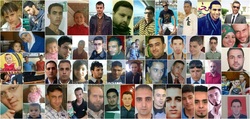
Today, Sunday, marks the first anniversary of the tragedy of a boat that capsized while carrying some 400 Palestinian migrants, mostly from Gaza, off the Egyptian coast of Alexandria while en route to Europe. The boat was deliberately sunk by a gang of smugglers.
The tragic incident hasn't received any international attention not even at the national level and the circumstances of the crime and the fate of more than 400 migrants is still a mystery that needs to be solved.
Only eight persons survived out of 450 migrants who were seeking to escape the miserable life. The vessel was hit by the Egyptian so-called al-Haj Rezq boat three times, according to a report issued by the Euro-Mediterranean Observatory.
The migrants' families condemned the concerned parties' failure to fulfill their responsibilities towards this incident.
Hamas Movement has warned against the deceptive illusions that are maliciously promoted in an attempt to encourage the Palestinians to leave Palestine, stressing that leaving the holy land of Palestine is a major sin.
Hamas also clarified that the real reason behind the Palestinians' immigration is the Israeli occupation which escalates its assaults against the Palestinians to force them flee the unbearable living conditions.
The tragic incident hasn't received any international attention not even at the national level and the circumstances of the crime and the fate of more than 400 migrants is still a mystery that needs to be solved.
Only eight persons survived out of 450 migrants who were seeking to escape the miserable life. The vessel was hit by the Egyptian so-called al-Haj Rezq boat three times, according to a report issued by the Euro-Mediterranean Observatory.
The migrants' families condemned the concerned parties' failure to fulfill their responsibilities towards this incident.
Hamas Movement has warned against the deceptive illusions that are maliciously promoted in an attempt to encourage the Palestinians to leave Palestine, stressing that leaving the holy land of Palestine is a major sin.
Hamas also clarified that the real reason behind the Palestinians' immigration is the Israeli occupation which escalates its assaults against the Palestinians to force them flee the unbearable living conditions.

A Palestinian refugee, called Maher Shehabi, was shot dead in the afternoon on Saturday by a sniper in the besieged al-Yarmouk refugee camp in Syria, local sources revealed.
Al-Yarmouk refugee camp has been suffering exposure to varying attacks by armed men of the Syrian regime coupled with the crippling blockade for over two years.
As a result, hundreds of Palestinian refugees died of hunger and outbreak of diseases.
Al-Yarmouk refugee camp has been suffering exposure to varying attacks by armed men of the Syrian regime coupled with the crippling blockade for over two years.
As a result, hundreds of Palestinian refugees died of hunger and outbreak of diseases.
5 sept 2015
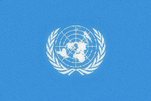
PA President and Fateh leader Mahmoud Abbas, on Saturday, instructed Palestinian Ambassador to the United Nations, Riyad Mansour, to take immediate actions to absorb Palestinian refugees in the occupied Palestinian Territories.
According to WAFA, Mansour was instructed to cooperate with the UN Secretary-General Ban Ki-moon in taking appropriate and necessary action to absorb displaced Palestinian refugees into the occupied Palestinian Territories.
The Presidency has been making contacts with the UN, EU and other relevant actors, urging them to pressurize the Israeli government to allow Palestinian refugees back into the oPt.
This action, the Presidency clarified, is intended to help stop the Palestinian refugee’s suffering and death as a result of ongoing displacement, especially refugees fleeing the war in Syria.
PLO Negotiations Affairs Department estimates original Palestinian refugees around 800,000 Christians and Muslims, who fled or were expelled prior to, during and after the 1948 war to create a state for Jews in Palestine. They and their descendents are often referred to as the “1948 refugees.”
In the aftermath of 1967 War launched by Israel against Jordan and Egypt, capturing and occupying the West Bank, including East Jerusalem and the Gaza Strip (the Occupied Palestinian Territories), about 200,000 Palestinians fled their homes in the West Bank and the Gaza Strip. They and their descendents are often referred to as the “1967 displaced persons.” Neither the 1948 refugees nor the 1967 displaced persons have been allowed by Israel to return to their homes in what is now Israel and the Occupied Palestinian Territories.
The Palestinians left their homes out of fear for their safety due to the military conflict. Many fled due to direct military assaults on their towns and villages; others were forcibly expelled by Zionist forces. Massacres of Palestinian civilians created an atmosphere of fear that understandably caused many Palestinians to seek safety elsewhere, it said.
Following the 1948 war, more than 400 Palestinian villages and towns were destroyed or resettled by Jews in an attempt to erase any evidence of a non-Jewish history and attachment to Palestine. Many destroyed Palestinian villages were rebuilt as Jewish towns and given Hebrew names.
Palestinian refugees have not been compensated for their proper loss. According to the PLO Negotiations Affairs department, conservative estimates of the current value of Palestinian property stolen or destroyed by Israel run well into billions of dollars, though estimates can vary based on whether non-material losses and compensation for host countries are included.
Palestinian refugees have the right to return to their homes, just as civilians fleeing a war are entitled to return to their homes. Their right to return is embodied in UN resolution 194, the Universal Declaration of Human Rights among others, it stressed.
Israel has been refusing to abide by international law with respect to the rights of the indigenous non-Jewish population. Israel defines itself as a “Jewish state” and Palestinian refugees are Christians and Muslims. Jews from all over the world, and even converts to Judaism, are allowed to immigrate to Israel under the “Law of Return,” but in a clear demonstration of religious/ethnic discrimination, the indigenous Palestinian Muslim and Christian populations are banned from returning to their homes.
“No settlement can be just and complete if recognition is not accorded to the right of the Arab refugee to return to the home from which he has been dislodged…It would be an offence against the principles of elemental justice if these innocent victims of the conflict were denied the right to return to their homes while Jewish immigrants flow into Palestine, and indeed, offer the threat of permanent replacement of the Arab refugees who have been rooted in the land for centuries.” said UN Mediator for Palestine, Count Folk Bernadotte.
Under UN Resolution 194 - (passed on 11 December 1948 and reaffirmed every year since 1948), “…the [Palestinian] refugees wishing to return to their homes and live at peace with their neighbors should be permitted to do so at the earliest practicable date, and that compensation should be paid for the property of those choosing not to return and for loss of or damage to property which, under principles of international law or in equity, should be made good by the Governments or authorities responsible.”
Current estimations indicate that Palestinian refugees number 6.5 million and constitute the world’s oldest and largest refugee population, making up more than one-fourth of the entire refugee population in the world. Half of the refugees live in Jordan, one-fourth in the oPt, and approximately 15 percent live in Syria and Lebanon. An additional 263,000 live in Israel. The remainder live scattered around the world, primarily in the rest of the Arab world, Europe and the Americas.
More than 1.3 million Palestinian refugees live in 59 UN-administered refugee camps in the oPt, Jordan, Syria and Lebanon and 12 unrecognized refugee camps: five in the West Bank, three in Jordan and four in Syria.
According to WAFA, Mansour was instructed to cooperate with the UN Secretary-General Ban Ki-moon in taking appropriate and necessary action to absorb displaced Palestinian refugees into the occupied Palestinian Territories.
The Presidency has been making contacts with the UN, EU and other relevant actors, urging them to pressurize the Israeli government to allow Palestinian refugees back into the oPt.
This action, the Presidency clarified, is intended to help stop the Palestinian refugee’s suffering and death as a result of ongoing displacement, especially refugees fleeing the war in Syria.
PLO Negotiations Affairs Department estimates original Palestinian refugees around 800,000 Christians and Muslims, who fled or were expelled prior to, during and after the 1948 war to create a state for Jews in Palestine. They and their descendents are often referred to as the “1948 refugees.”
In the aftermath of 1967 War launched by Israel against Jordan and Egypt, capturing and occupying the West Bank, including East Jerusalem and the Gaza Strip (the Occupied Palestinian Territories), about 200,000 Palestinians fled their homes in the West Bank and the Gaza Strip. They and their descendents are often referred to as the “1967 displaced persons.” Neither the 1948 refugees nor the 1967 displaced persons have been allowed by Israel to return to their homes in what is now Israel and the Occupied Palestinian Territories.
The Palestinians left their homes out of fear for their safety due to the military conflict. Many fled due to direct military assaults on their towns and villages; others were forcibly expelled by Zionist forces. Massacres of Palestinian civilians created an atmosphere of fear that understandably caused many Palestinians to seek safety elsewhere, it said.
Following the 1948 war, more than 400 Palestinian villages and towns were destroyed or resettled by Jews in an attempt to erase any evidence of a non-Jewish history and attachment to Palestine. Many destroyed Palestinian villages were rebuilt as Jewish towns and given Hebrew names.
Palestinian refugees have not been compensated for their proper loss. According to the PLO Negotiations Affairs department, conservative estimates of the current value of Palestinian property stolen or destroyed by Israel run well into billions of dollars, though estimates can vary based on whether non-material losses and compensation for host countries are included.
Palestinian refugees have the right to return to their homes, just as civilians fleeing a war are entitled to return to their homes. Their right to return is embodied in UN resolution 194, the Universal Declaration of Human Rights among others, it stressed.
Israel has been refusing to abide by international law with respect to the rights of the indigenous non-Jewish population. Israel defines itself as a “Jewish state” and Palestinian refugees are Christians and Muslims. Jews from all over the world, and even converts to Judaism, are allowed to immigrate to Israel under the “Law of Return,” but in a clear demonstration of religious/ethnic discrimination, the indigenous Palestinian Muslim and Christian populations are banned from returning to their homes.
“No settlement can be just and complete if recognition is not accorded to the right of the Arab refugee to return to the home from which he has been dislodged…It would be an offence against the principles of elemental justice if these innocent victims of the conflict were denied the right to return to their homes while Jewish immigrants flow into Palestine, and indeed, offer the threat of permanent replacement of the Arab refugees who have been rooted in the land for centuries.” said UN Mediator for Palestine, Count Folk Bernadotte.
Under UN Resolution 194 - (passed on 11 December 1948 and reaffirmed every year since 1948), “…the [Palestinian] refugees wishing to return to their homes and live at peace with their neighbors should be permitted to do so at the earliest practicable date, and that compensation should be paid for the property of those choosing not to return and for loss of or damage to property which, under principles of international law or in equity, should be made good by the Governments or authorities responsible.”
Current estimations indicate that Palestinian refugees number 6.5 million and constitute the world’s oldest and largest refugee population, making up more than one-fourth of the entire refugee population in the world. Half of the refugees live in Jordan, one-fourth in the oPt, and approximately 15 percent live in Syria and Lebanon. An additional 263,000 live in Israel. The remainder live scattered around the world, primarily in the rest of the Arab world, Europe and the Americas.
More than 1.3 million Palestinian refugees live in 59 UN-administered refugee camps in the oPt, Jordan, Syria and Lebanon and 12 unrecognized refugee camps: five in the West Bank, three in Jordan and four in Syria.
